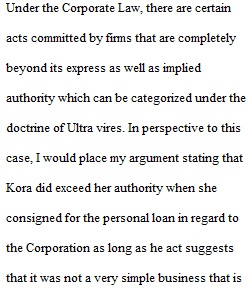


Q 24-2: Kora Nayenga and two business associates formed a corporation called Nayenga Corp. for the purpose of selling computer services. Kora, who owned 50 percent of the corporate shares, served as the corporation’s president. Kora wished to obtain a personal loan from his bank for $250,000, but the bank required the note to be co-signed by a third party. Kora co-signed the note in the name of the corporation. Later, Kora defaulted on the note, and the bank sued the corporation for payment. The corporation asserted, as a defense, that Kora had exceeded his authority when he co-signed the note. Had he? Explain.
Q 24-3: In 2004, the Watergate Hotel in Washington, D.C., obtained a loan from PB Capital. At this time, hotel employees were represented by a union. Under a collective bargaining agreement, the hotel had agreed to make contributions to an employees’ pension fund run by the union. In 2007, the hotel was closed due to poor business, although the owner stated that the hotel would reopen in 2010. Despite this expectation, PB Capital—which was still owed $40 million by the hotel owner—instituted foreclosure proceedings. At the foreclosure sale, PB Capital bought the hotel and reopened it under new management and with a new workforce. The union sued PB Capital, contending that it should pay $637,855 owed by the previous owner into the employees’ pension fund. Should PB Capital, as the hotel’s new owner, have to incur the previous owner’s obligation to pay into the pension fund under the theory of successor liability? Why or why not?24-7 In 1997, Leon Greenblatt, Andrew Jahelka, and Richard Nichols incorporated Loop Corp. with only $1,000 of capital. Three years later, Banco Panamericano, Inc., which was run entirely by Greenblatt and owned by a Greenblatt family trust, extended a large line of credit to Loop. Loop’s subsidiaries then participated in the credit, giving $3 million to Loop while acquiring a security interest in Loop itself. Loop then opened an account with Wachovia Securities, LLC, to buy stock shares using credit provided by Wachovia. When the stock values plummeted, Loop owed Wachovia $1.89 million. Loop also defaulted on its loan from Banco, but Banco agreed to lend Loop millions of dollars more. Rather than repay Wachovia with the influx of funds, Loop gave the funds to closely related entities and “compensated” Nichols and Jahelka without issuing any W-2 forms (forms reporting compensation to the Internal Revenue Service). Loop made loans to other related entities and shared office space, equipment, and telephone and fax numbers with related entities. Loop also moved employees among related entities, failed to file its tax returns on time (or sometimes at all), and failed to follow its own bylaws. In a lawsuit brought by Wachovia, can the court hold Greenblatt, Jahelka, and Nichols personally liable by piercing the corporate veil? Why or why not?
View Related Questions